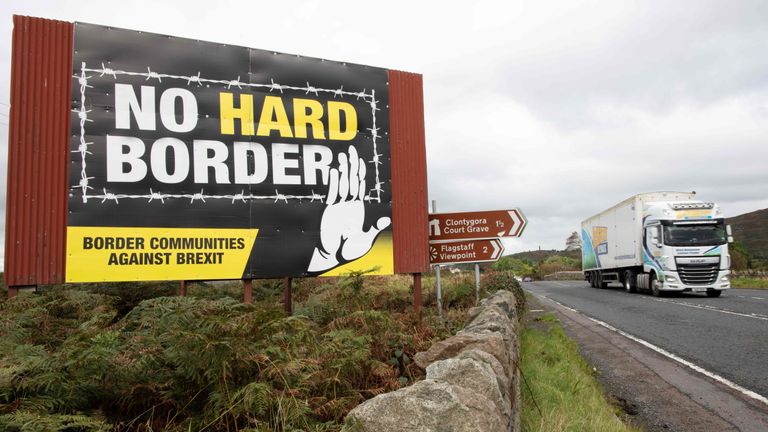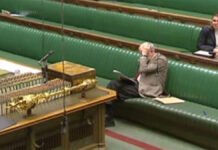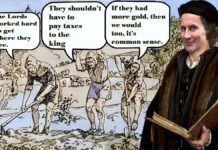Boris Johnson’s controversial bid to override parts of the Brexit deal has cleared a major hurdle in parliament.
Government wins second reading vote on internal market bill with a majority of 77
MPs have voted to approve the internal market bill at its second reading, with a government majority of 77, despite concerns it could breach international law.
Ayes :340
Noes: 263
The Tory’s had been expected to win the key vote on his Internal Market Bill, given the Conservatives’ large majority in the House of Commons.
The bill will now move to committee stage to be debated and amended further.
Johnson kept most of his party on side by saying the most controversial part of the bill may “never be invoked” if a trade deal is struck with Brussels.
Labour’s amendment to block a second reading of the internal market bill has been defeated by 213 votes to 349, a government majority of 136.
Ed Miliband returns as Labour leader – for one night only
Standing in for Keir Starmer and responding to Boris Johnson’s opening statement on the Internal Markets Bill, Miliband was lit by indignation as he methodically outlined the government’s oscillations and inconsistencies over the Withdrawal Agreement – the Brexit departure deal. However, Johnson stole a march on Miliband by claiming the bill would only be used if a deal with the EU was not struck.
Sir Keir Starmer missed the second reading of the bill being absent due to coronavirus self-isolation rules.
The bill, published on 9 September, has become contentious as it overrides parts of the EU’s legal divorce deal, known as the Withdrawal Agreement, which came into effect on 31 January 2020.
It was drawn up to ensure trade between all four home nations remains barrier-free after the Brexit transition period ends on 31 December 2020.
One of the major issues is how that can apply to Northern Ireland when it shares a border with the Republic of Ireland, which will remain in the EU.
When the UK joined the then-European Economic Community in 1973, most of the British trade laws were replaced by European laws.
The devolution of powers to Scotland, Wales and Northern Ireland in the 1990s was made within the context of EU membership, so they had power over some policy areas, such as agriculture, but they could not contravene EU law.
What is the purpose of the UK Internal Market Bill?
The Internal Market Bill aims to maintain the joined-up market to ensure all four of the UK’s nations are not limited by regulations determined by each devolved government.
It also aims to guarantee the international community has access to the UK as a whole, knowing the standards and rules are the same throughout.
When the UK leaves the EU, the devolved powers will have no constraints from the EU so could set up their own rules on issues like food safety.
The bill aims to create common rules that apply across the whole of the UK – essentially replacing the EU’s role as the ultimate arbiter of most trade policies.
What are the bill’s proposals?
The bill proposes to bring forward legislation that will enshrine “mutual recognition and non-discrimination”.
Mutual recognition is defined in the bill as making sure any goods, services and qualifications which can be sold or used in one part of the UK can also be in another part of the UK, with some exceptions for Northern Ireland as laid out in the protocol (more on the protocol below).
Non-discrimination laws would make it unlawful for any of the four nations’ governments to introduce rules or regulations that would favour goods or services in one part of the UK over another.
However, the bill could condradict the Withdrawal Agreement – and therefore international law – as it says ministers could have the power to “disapply” previously agreed rules relating to the movement of goods, including any under the Northern Ireland protocol.
It also says ministers can provide financial assistance to any person or company, which could mean it is overriding state aid rules set out in the Withdrawal Agreement.
The draft legislation says: “Certain provisions to have effect notwithstanding inconsistency or incompatibility with international or other domestic law.”
It adds any parts of the Brexit deal which contradict it “cease to be recognised and available in domestic law”.
There is also a list of precedents the new law would override, including “any other legislation, convention or rule of international or domestic law whatsoever, including any order, judgement or decision of the Europe Court or of any other court or tribunal”.
An independent body to monitor how the UK’s internal market is functioning is also proposed in the bill to oversee the implementation of these principles and to consult with businesses and consumers.
But, the bill says this could not lead to the body directly overturning the decisions of a devolved government.
It also promises Edinburgh, Belfast and Cardiff will be given new powers to create their own laws in 160 policy areas once the transition period is over.
What is the Northern Ireland protocol?
A crucial part of the Internal Market Bill, and therefore the Withdrawal Agreement, the Northern Ireland protocol aims to avoid the introduction of a hard border on the island of Ireland in the event of a no-deal Brexit.
It states that Northern Ireland will remain part of the UK’s customs territory so if the UK signs a free trade deal with another country, Northern Irish goods would be included.
However, Northern Ireland will have to stick to some EU rules to allow goods to move freely into the Republic.

Goods moving from the rest of the UK to Northern Ireland will not be subject to a tariff unless they are “at risk” of being moved into the EU afterwards.
Environment Secretary George Eustice said there will need to be “some checks on some goods” and “some customs processes but not customs checks” at the border with the Republic.
Goods coming from Northern Ireland to Great Britain can have “unfettered” access, according to the Internal Market Bill.
This means that goods sold in Northern Ireland will be accepted everywhere else in the UK, but the reverse may not be true.
It also could lead to increased checks on the border with the Republic of Ireland, which the UK and EU previously agreed could not happen.
Will the bill break international law?
Yes – by the government’s own admission.
Northern Ireland Secretary Brandon Lewis declared to critics in the House of Commons that “this does break international law” but said it was only in “a very specific and limited way”.
He explained the bill would essentially override a key part of the withdrawal agreement – Article four – which says it takes precedence over UK domestic law.
This, he said, was because the government wants to allow ministers to decide what constitutes state aid in Northern Ireland and what goods arriving in it from Great Britain should be subject to customs checks.
Information courtesy Sky News Alix Culbertson
Help Us Sustain Ad-Free Journalism
Sorry, I Need To Put Out the Begging Bowl
Independent Journalism Needs You
Our unwavering dedication is to provide you with unbiased news, diverse perspectives, and insightful opinions. We're on a mission to ensure that those in positions of power are held accountable for their actions, but we can't do it alone. Labour Heartlands is primarily funded by me, Paul Knaggs, and by the generous contributions of readers like you. Your donations keep us going and help us uphold the principles of independent journalism. Join us in our quest for truth, transparency, and accountability – donate today and be a part of our mission!
Like everyone else, we're facing challenges, and we need your help to stay online and continue providing crucial journalism. Every contribution, no matter how small, goes a long way in helping us thrive. By becoming one of our donors, you become a vital part of our mission to uncover the truth and uphold the values of democracy.
While we maintain our independence from political affiliations, we stand united against corruption, injustice, and the erosion of free speech, truth, and democracy. We believe in the power of accurate information in a democracy, and we consider facts non-negotiable.
Your support, no matter the amount, can make a significant impact. Together, we can make a difference and continue our journey toward a more informed and just society.
Thank you for supporting Labour Heartlands












